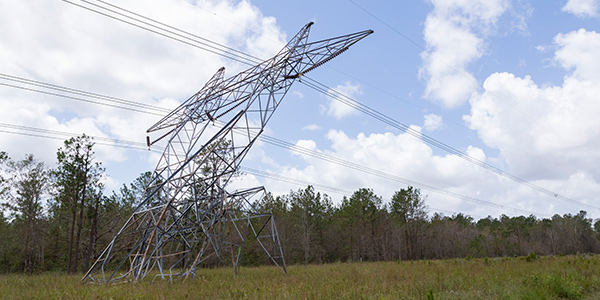More than four months after Hurricane Laura’s landfall in its South region, MISO is questioning whether its value-of-lost load (VOLL) should be used to price energy during extraordinary weather events.
During a Market Subcommittee teleconference last week, Director of Market Design Kevin Vannoy solicited stakeholder opinions as to whether the RTO’s $3,500/MWh VOLL pricing is appropriate during force majeure events.
“What should the market reflect when we take actions to manage transmission, balance the system, balance the region?” Vannoy asked stakeholders during the call Jan. 7.
Vannoy also asked whether MISO’s pricing logic for dead buses should be reviewed. Stakeholders have until Jan. 28 to submit their feedback.
MISO’s Independent Market Monitor continued its call for a retroactive pricing change for the dead buses priced at VOLL in Hurricane Laura’s wake. (See “Laura Pricing in Question,” MISO Monitor Reviews Blustery Fall.)
The Monitor’s David Patton said MISO’s after-the-fact settlements produced $90 million in balancing congestion costs, which showed up on customer bills as uplift charges. He said approximately $10 million of the cost was because of dead-bus pricing at $3,500/MWh in Louisiana’s Lake Charles area, where Hurricane Laura destroyed enough distribution and transmission lines to effectively create a dead zone.
“We’re concerned about some of these settlements applying the VOLL pricing to dead buses,” Patton said. “Load is not being served because the system effectively doesn’t exist to serve it. The load is not being served because we lack sufficient resources to serve it. The load is not being served because the system is demolished.”
He went on to say MISO’s VOLL settlements near Lake Charles for Aug. 27 are “not consistent with how MISO settles dead buses in the day-ahead market, which would price such a load zone at basically $20/MWh.”
MISO’s day-ahead dead-bus pricing relies on prices from nearby live buses.
“That’s what the Tariff calls for,” Patton said.
Vannoy said an evaluation of MISO’s pricing practices at dead buses will likely be rolled into MISO’s existing scarcity pricing reconsideration, which was already poised to bring changes to the VOLL and operating reserve demand curve. (See MISO Revisits Scarcity Pricing Rethink.)
The grid operator is hosting a workshop on the scarcity price effort on Jan. 22.
Market participants impacted by Hurricane Laura had until December to initiate a settlement dispute with MISO. The RTO is now in confidential discussions over the disputes.
Customized Energy Solutions’ Ted Kuhn asked whether MISO should pause collections on some Hurricane Laura-induced settlements until it determines whether VOLL pricing should apply to the event.
“What if we did that rather than everyone having to scramble and file legal briefs, so their rights are protected?” he asked.
Vannoy said he wouldn’t comment on the Aug. 27 retroactive settlements. “I think the goal here is to look at future modifications and future event applications,” he explained.
Laura Rauch, MISO’s director of settlements, said if settlement changes are granted after dispute resolution, other affected market participants will be notified and invited to final discussions to hear the outcome.
“The Tariff is very clear that changes to historic settlements require disputes submitted in a timely manner,” Rauch said. “To the extent that we make a determination that the historic settlements need modification, we’ll review that for all impacted market participants.”
MISO Corporate Counsel Jacob Krouse added that affected market participants can challenge the RTO’s determinations even if they haven’t filed dispute resolutions.
Patton said the hurricane’s devastation might have been minimized if MISO had specifically assigned capacity to load.
“The South is one of the worst problems in this regard. In the Midwest region, we don’t have as big a problem with this disconnect,” he said, adding that load pockets in Louisiana and Texas are limited by transmission constraints.
“The capacity values do not correspond to the load pockets. It’s all merged together,” he said. “This might not have happened … if we defined our loads better.”




